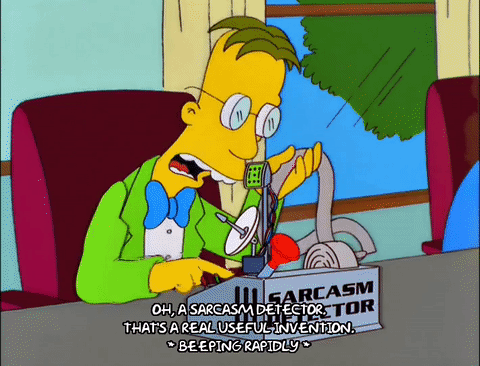Photo: Sheer Photo, Inc (Getty)
It’s Monday morning and, like always, you’re sitting at your desk, blankly staring at the flickering computer monitor, thinking about your life’s choices and problems when, all of a sudden, you see that lonely number in your e-mail inbox. A mix of joy and curiosity overwhelms you as you start reading the message from your old friend thanking you for those two concert tickets you gave him. You feel happiness and pride though he continues to talk about how they turned out to be counterfeit and it ruined their entire night. Wait? Sarcasm? In an e-mail? How is that even possible?

Before we take a look at this problem, let’s try to define sarcasm first and perhaps differentiate it from irony. A lot of kids from the ’90s believe that irony is actually what is depicted in the song “Ironic” by Alanis Morissette. That is full of bad examples. She didn’t really grasp the concept all that well. To rectify it, the guys at College Humor modified her lyrics line by line and created something truly ironic. So, what is irony? It’s when you present things completely opposite from how they are in real life. Why? Mostly because you want to be funny or at least somewhat amusing.

We can hear you screaming after this wall of text – “Tell us what is sarcasm then?” Simply put, sarcasm is the use of irony to mock or offend someone. When you’re sarcastic, you are intentionally directing your irony towards someone you dislike or want to put down. It doesn’t seem very nice, does it? Well, people aren’t very nice beings to begin with. You could argue the point all you like, but that just shows your need to be right – which isn’t all that nice.
So, while we may agree that sarcasm is not always that easy to spot in person, things get a lot more difficult in the written form. The problem is that the tone of one’s voice, face expressions and even gesticulations play an essential part in conveying sarcasm. No matter how many emoticons, exclamation marks or how much capitalization you use, it simply isn’t the same. Our brain has to work extra hard to detect it and often fails. How do we do it, then?
Sarcasm and Friends
Most people believe that it has something to do with knowing the person who is sending a sarcastic message. The idea is that you’re more likely to recognize sarcasm in your friend’s message because you’re familiar with his usual way of expressing thoughts. However, a recent study (a proper one) decided to test this common belief and see whether friends are better at identifying emotions in e-mails. The results showed that there’s really no difference between friends and strangers when it comes to detecting written sarcasm. Basically, we all suck at it. Of course, we immediately see a problem with this research – how often do you send e-mails to your friends? It seems a bit more professional; more suitable for business communication, right? Well, unfortunately, we weren’t there to point out this problem.

Now, while we may not possess any inherent mechanism for detecting sarcasm in written form, we can still learn how to recognize it in a text. Here are just a couple of things that might help you spot that elusive sarcasm.
Sarcastic writers tend to use hyperbole (a great exaggeration) in their sentences to convey their frustration or other emotions.
In somewhat informal writing, they can use different spelling (like riiiight) to mimic the emphasized, sarcastic tone in speech.
If you can’t spot sarcasm, maybe you can spot aggression in writing as they often go hand-in-hand.
If you know the person, try to see if this way of writing actually differs from anything they normally write.
On the other hand, if you don’t know the person who sent you the e-mail, chances are they won’t actually be sarcastic.
Obviously, the context plays an important role and, sometimes, it’s the only thing you have to analyze. Sarcastic writing will seem somewhat out of place.
One of the best ways to check if your friend had sent you a sarcastic e-mail is to try and respond in the same manner. Their reaction will tell you all you need to know.
With all this in mind, you realize that you’re doomed anyway when it comes to reading sarcasm, so try not to fret about it too much.
Via Science Daily




